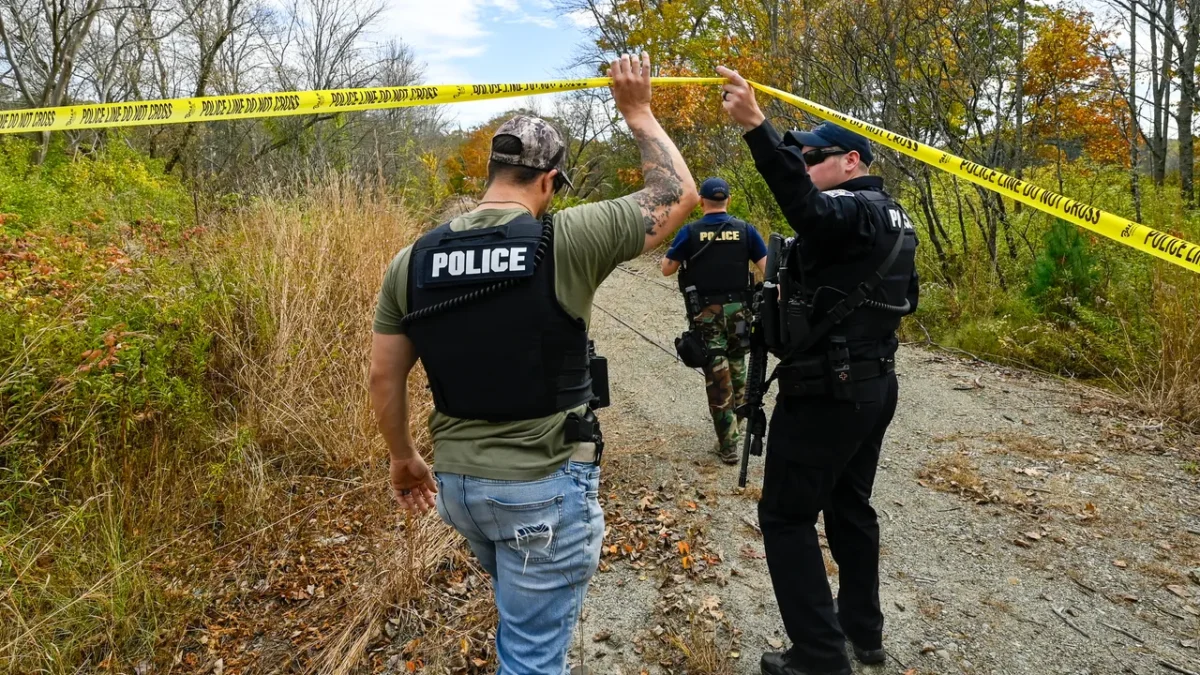Introduction to the Maine Shooting
Tragedy strikes once again as the quiet state of Maine Shooting is shaken by a horrifying shooting incident. The echoes of gunshots reverberate through peaceful neighborhoods, leaving residents in shock and mourning. In the wake of this devastating event, questions arise about the causes and consequences that led to such a senseless act of violence. Join us as we delve into the heart-wrenching story of the Maine Shooting, exploring its impact on communities, examining gun laws in the state, and shedding light on potential motivations behind this tragic event. It’s time to uncover the truth behind this heartbreaking tragedy and seek solutions for a safer future. Let’s begin our journey together!
Background on Gun Laws in Maine
Maine Shooting, like many other states in the United States, has its own set of gun laws that regulate the possession and use of firearms. These laws aim to strike a balance between protecting individual rights and ensuring public safety.
In Maine Shooting, individuals who are 18 years or older can legally possess a firearm without a permit. However, they need to obtain a concealed carry permit if they wish to carry a concealed weapon in public. This permit requires background checks and completion of safety courses.
Additionally, Maine Shooting does not require registration of firearms or impose restrictions on magazine capacity or assault weapons. The state also allows for open carry of firearms without the need for a license.
The lenient gun laws in Maine have been met with mixed reactions. Advocates argue that these laws uphold Second Amendment rights and allow responsible citizens to protect themselves. On the other hand, critics express concerns about potential risks associated with easy access to firearms.
It is worth noting that despite relatively relaxed regulations compared to some other states, Maine Shooting still maintains measures such as background checks and concealed carry permits aimed at promoting safe gun ownership and preventing misuse.
Understanding the background of gun laws in Maine Shooting provides context for discussions surrounding incidents like the recent shooting. It highlights how differing perspectives on gun control shape policy decisions within each state.
Possible Motivations of the Shooter
Understanding the motivations behind a shooting incident is crucial to prevent such tragedies from occurring again. While it may be difficult to pinpoint the exact reasons that led to the Maine shooting, several possible factors could have played a role.
One potential motivation could be personal grievances or conflicts. The shooter may have experienced some form of injustice, betrayal, or disappointment which fueled their anger and desire for revenge. This could have been directed towards specific individuals or groups, leading them to resort to violence as a means of expressing their frustration.
Another possibility is mental health issues. Untreated mental illnesses can often manifest in violent behavior if left unaddressed. It’s important not to stigmatize those with mental health conditions but rather focus on providing adequate support and treatment options for individuals who may need them.
Additionally, societal influences cannot be ignored when examining potential motivations for such acts of violence. The glorification of violence in media and online platforms can desensitize individuals and contribute to a distorted perception of reality. Social isolation and feelings of alienation can also push someone towards violent tendencies as they struggle with a lack of connection and belonging.
While these are just some conjectures about the possible motivations behind the Maine shooting, it is essential not to jump to conclusions without concrete evidence or expert analysis. Further investigation by law enforcement authorities will hopefully shed more light on this tragic event so we can work towards preventing similar incidents in the future.
Remember, each case is unique, and understanding individual motives requires a thorough examination by professionals trained in psychology and criminology fields.
Impact on Local Community and State
The tragic Maine Shooting has had a profound impact on the local community and the state as a whole. When such acts of violence occur, they leave lasting scars that can be felt by everyone involved.
First and foremost, there is an immediate impact on the families and loved ones of the victims. Their lives are forever changed, filled with grief, anger, and confusion. The loss of a loved one to senseless violence is something that no one should ever have to endure.
But it doesn’t stop there. The ripple effect extends to neighbors, friends, and co-workers – all those who knew the victims or were part of their lives in some way. The shockwaves reverberate through close-knit communities where people come together during times of tragedy but also struggle to make sense of what happened.
Furthermore, the entire state feels this impact as well. News spreads quickly in today’s digital age, and when an incident like this occurs within our borders, it becomes part of our collective consciousness. It serves as a reminder that violence can touch us anywhere – even in places we consider safe-havens.
The economic repercussions cannot be ignored either. Such incidents can deter tourists from visiting an area or potential businesses from investing in its growth. This loss not only affects individual livelihoods but also impacts the overall prosperity of communities across Maine Shooting.
In addition to these immediate consequences, there may also be long-term effects on mental health within affected communities. Trauma experts suggest that individuals who witness or experience such violence may suffer from post-traumatic stress disorder (PTSD) or other psychological distress for years to come.
The shooting has undoubtedly left its mark on both the local community and the state at large. We as citizens need to acknowledge this impact so that we can work towards healing wounds and preventing future tragedies like these from occurring again.
Response from Government Officials and Law Enforcement
The Maine shooting has sparked a swift response from government officials and law enforcement agencies. In the aftermath of this tragic event, authorities have been working tirelessly to investigate the incident and ensure the safety of the community.
State Governor Janet Mills expressed her condolences to the victims’ families and emphasized the need for immediate action. She vowed to work with legislators to strengthen gun control measures in Maine Shooting.
Law enforcement agencies have also been actively involved in addressing this issue. Police departments across the state are increasing patrols in affected areas, providing support to grieving communities, and enhancing their efforts to prevent future acts of violence.
Additionally, federal agencies such as the FBI are collaborating with local authorities in conducting thorough investigations into possible motives behind the shooting. Their goal is not only to bring justice but also to prevent similar incidents from occurring again.
The response from government officials and law enforcement reflects a united front against gun violence. While opinions on specific actions may differ, there is an undeniable commitment among these stakeholders to prioritize public safety above all else.
It is crucial for ongoing discussions about gun control laws, mental health initiatives, and community outreach programs that aim at preventing such tragedies moving forward. The collaboration between various levels of government will be key in finding comprehensive solutions that address both individual rights and public safety concerns.
Discussions about Gun Control and Mental Health Issues
Gun control and mental health issues have been at the forefront of discussions following the tragic Maine shooting. Many people are questioning whether stricter gun control measures could prevent such incidents from occurring in the future. On one side of the debate, proponents argue that tightening gun laws would make it more difficult for individuals with criminal intent or mental health problems to obtain firearms.
Those in favor of stricter regulations highlight examples from other countries where tighter restrictions on firearm ownership have resulted in lower rates of gun violence. They believe that implementing similar measures in Maine Shooting could potentially save lives and reduce the risk of mass shootings.
On the other hand, opponents argue that restricting access to guns infringes upon their constitutional rights as outlined in the Second Amendment. They contend that responsible citizens should not be punished for the actions of a few individuals who misuse firearms. Instead, they suggest focusing on improving mental health care services to identify and treat those at risk before they resort to violence.
The issue becomes even more complex when considering how mental health factors into these discussions. Some argue that addressing underlying mental health issues is crucial in preventing acts of violence, regardless of access to firearms. Others emphasize that while mental illness can contribute to violent behavior, it does not mean all individuals with psychiatric disorders are prone to committing crimes.
As conversations around gun control and mental health continue, finding common ground will undoubtedly be challenging. It is essential for policymakers and experts from various fields – including law enforcement, psychology, and sociology – to come together and explore comprehensive solutions that balance individual rights with public safety concerns.
Only through open dialogue and a willingness to consider different perspectives can we hope to address both sides’ valid concerns effectively. The goal should always be focused on creating safer communities while respecting personal liberties – a delicate balancing act requiring careful consideration and collaboration among stakeholders.
Conclusion and Calls for Action
The tragic Maine shooting has left a lasting impact on the local community and the state as a whole. It is crucial to examine the causes and consequences of such incidents to prevent future tragedies.
While it is challenging to determine the exact motivations of the shooter, it is clear that there are underlying issues that need to be addressed. The availability and accessibility of firearms play a significant role in these types of violent acts. Therefore, reviewing gun laws should be a priority for lawmakers in Maine Shooting.
Additionally, discussions about mental health must continue, both within communities and at a governmental level. Adequate support systems need to be established to identify individuals who may pose risks not only to themselves but also to others around them.
Government officials and law enforcement agencies have an essential role in responding swiftly and effectively during such crises. Collaborative efforts between these bodies can help ensure better coordination, and response times, and ultimately save lives.
Society as a whole needs to engage in open conversations about gun control measures while respecting diverging opinions. Finding common ground through respectful dialogue can lead us toward effective solutions that prioritize public safety without infringing upon individual rights.
In conclusion (without using “In conclusion”), addressing the complex issue surrounding mass shootings requires multifaceted approaches involving changes in legislation, improved mental health support systems, enhanced law enforcement strategies, and active participation from all members of society. By working together towards preventing similar incidents from occurring again, we can strive towards creating safer communities where everyone feels secure.
You may also read
cost-of-full-mouth-dental-implants

